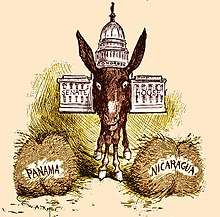Imperative logic
Imperative logic is the field of logic concerned with arguments containing sentences in the imperative mood. In contrast to sentences in the declarative mood, imperatives are neither true nor false. This leads to a number of logical dilemmas, puzzles, and paradoxes. Unlike classical logic, there is almost no consensus on any aspect of imperative logic.
Jørgensen's dilemma
One of a logic's principal concerns is logical validity. It seems that arguments with imperatives can be valid. Consider:
- P1. Take all the books off the table!
- P2. Foundations of Arithmetic is on the table.
- C1. Therefore, take Foundations of Arithmetic off the table!
However, an argument is valid if the conclusion follows from the premises. This means the premises give us reason to believe the conclusion, or, alternatively, the truth of the premises determines truth of the conclusion. Since imperatives are neither true nor false and since they are not proper objects of belief, none of the standard accounts of logical validity apply to arguments containing imperatives.
Here is the dilemma. Either arguments containing imperatives can be valid or not. On the one hand, if such arguments can be valid, we need a new or expanded account of logical validity and the concomitant details. Providing such an account has proved challenging. On the other hand, if such arguments cannot be valid (either because such arguments are all invalid or because validity is not a notion that applies to imperatives), then our logical intuitions regarding the above argument (and others similar to it) are mistaken. Since either answer seems problematic, this has come to be known as Jørgensen's dilemma, named after Jørgen Jørgensen (da).
While this problem was first noted in a footnote by Frege, it received a more developed formulation by Jørgensen.[1][2]
Ross's paradox
Alf Ross observed that there is a potential problem for any account of imperative inference.[3][4] Classical logic validates the following inference:
- P1. The room is clean.
- C1. Therefore, the room is clean or grass is green.
This inference is called disjunction introduction. However, a similar inference does not seem to be valid for imperatives. Consider:
- P1. Clean your room!
- C1. Therefore, clean your room or burn the house down!
Ross's paradox highlights the challenge faced by anyone who wants to modify or add to the standard account of validity. The challenge is what we mean by a valid imperative inference. For valid declarative inference, the premises give you a reason to believe the conclusion. One might think that for imperative inference, the premises give you a reason to do as the conclusion says. While Ross's paradox seems to suggest otherwise, its severity has been subject of much debate.
Mixed inferences
The following is an example of a pure imperative inference:
- P1. Do both of the following: wash the dishes and clean your room!
- C1. Therefore, clean your room!
In this case, all the sentences making up the argument are imperatives. Not all imperative inferences are of this kind. Consider again:
- P1. Take all the books off the table!
- P2. Foundations of Arithmetic is on the table.
- C1. Therefore, take Foundations of Arithmetic off the table!
Notice that this argument is composed of both imperatives and declaratives and has an imperative conclusion.
Mixed inferences are of special interest to logicians. For instance, Henri Poincaré held that no imperative conclusion can be validly drawn from a set of premises which does not contain at least one imperative.[5] While R.M. Hare held that no declarative conclusion can be validly drawn from a set of premises which cannot validly be drawn from the declaratives among them alone.[6] There is no consensus among logicians about the truth or falsity of these (or similar) claims and mixed imperative and declarative inference remains vexed.
Applications
Aside from intrinsic interest, imperative logic has other applications. The use of imperatives in moral theory should make imperative inference an important subject for ethics and metaethics. Also, many major computer programming languages are imperative programming languages.
References
- Frege, G. (1892) 'On sense and reference', in Geach and Black (eds.) Translations from the Philosophical Writings of Gottlob Frege Oxford: Blackwell.
- Jørgensen, J. (1938) 'Imperatives and logic', Erkenntnis 7: 288-98.
- Ross, A. (1941) ‘Imperatives and Logic’, Theoria 7: 53–71. doi:10.1111/j.1755-2567.1941.tb00034.x
- Ross, A. (1944) ‘Imperatives and Logic’, Philosophy of Science 11: 30–46.
- Poincaré, Henri (1913). Dernières Pensées. Paris: Ernest Flammarion.
- Hare, Richard M. (1967). Some alleged differences between imperatives and indicatives. Mind, 76, 309-326.
Further reading
- Charles Leonard Hamblin (1987). Imperatives. Basil Blackwell. ISBN 978-0-631-15193-7.
- Peter B. M. Vranas (2010), IMPERATIVES, LOGIC OF*, Entry for The International Encyclopedia of Ethics
- Harry J. Gensler (2010). Introduction to Logic (2nd ed.). Taylor & Francis. Chapter 12: Deontic and Imperative Logic. ISBN 978-0-415-99650-1. Covers mostly the approach of Héctor-Neri Castañeda.
External links
- Mitchell S. Green, Imperative Logic, University of Virginia


